The new millennium and the so-called
war on terror
2000s
“It's not only not trusting institutions, and not trusting the government, but also not trusting the person next door”
- Juliet Schor
Overview
1
2
STELLAR WIND & THE SURVEILLANCE STATE
Under the veil of national security, the Bush administration grants new powers for US security services to spy on US citizens through ‘Stellar Wind’ - a codename for the President’s Surveillance Program.
New legislation such as the USA PATRIOT (Patriot) Act and new bodies such as the Department of Homeland Security, are established in wake of the attacks.
3
THE SO CALLED
‘WAR ON TERROR’
Many Muslims, including American Muslims, face increased demonisation and see the ‘War on Terror’ as a war on them.
In 2005, Hurricane Katrina would expose the racial division in the southern states and an administration out of touch with the people.
THE DISPUTED ELECTION: BUSH vs. GORE
The 2000 presidential election is one of the closest in US history, and one of the most disputed. Democratic candidate Al Gore finally concedes the presidency to Republican George W. Bush after a 36-day Florida recount battle and the intervention of the US Supreme Court. The contested election reveals the exploited flaws of the American electoral system.
Within a year of George W. Bush taking office, the United States would be rocked by the attacks of September 11, 2001.
1
The disputed election: Bush vs. Gore
Presidential candidates Democratic Vice President Al Gore, left, and Republican Texas Governor George W. Bush argue a point during their first presidential debate October 3, 2000 at the University of Massachusetts in Boston. (Photo by Darren McCollester/Newsmakers)
“The 2000 election was a moment in which, for a lot of people, trust, belief and faith in the electoral system was eroded pretty dramatically.”
- Juliet Schor
In November 2000,
In November 2000, the United States was looking for a new president for the start of a new millennium.
The race between Democrat Vice President Al Gore and Republican Governor of Texas George W. Bush, would be one of the closest election races in US history, and, one of the most controversial.
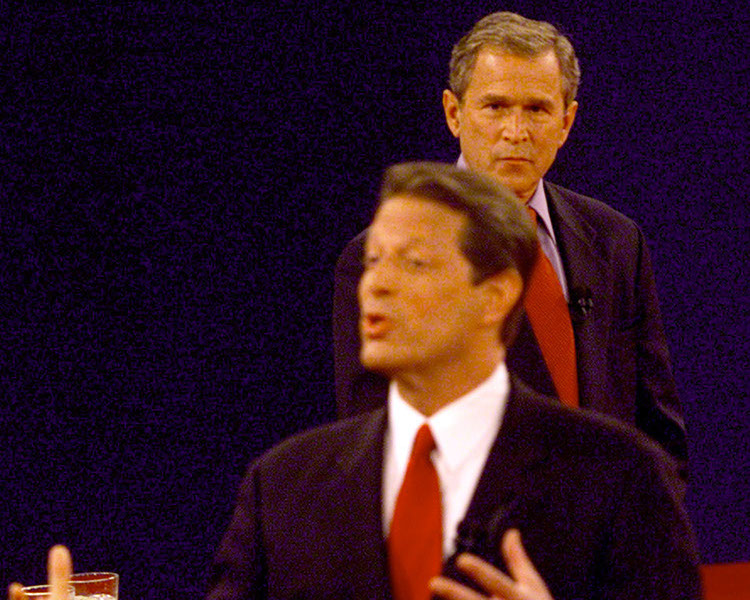
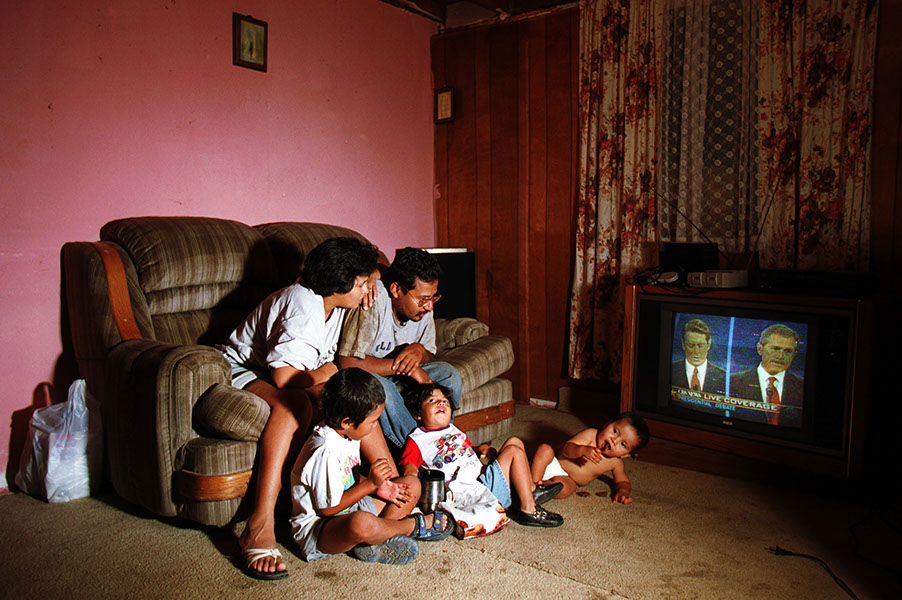
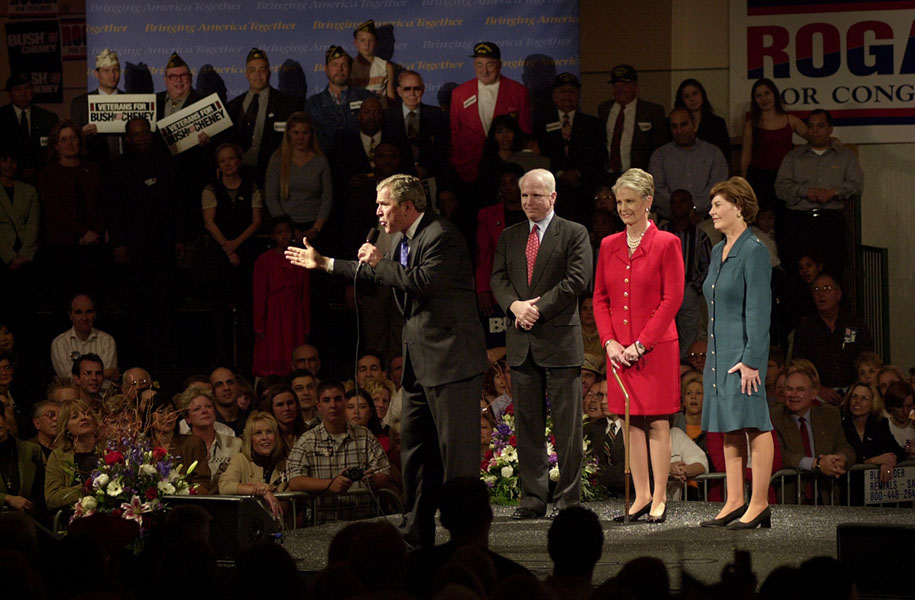
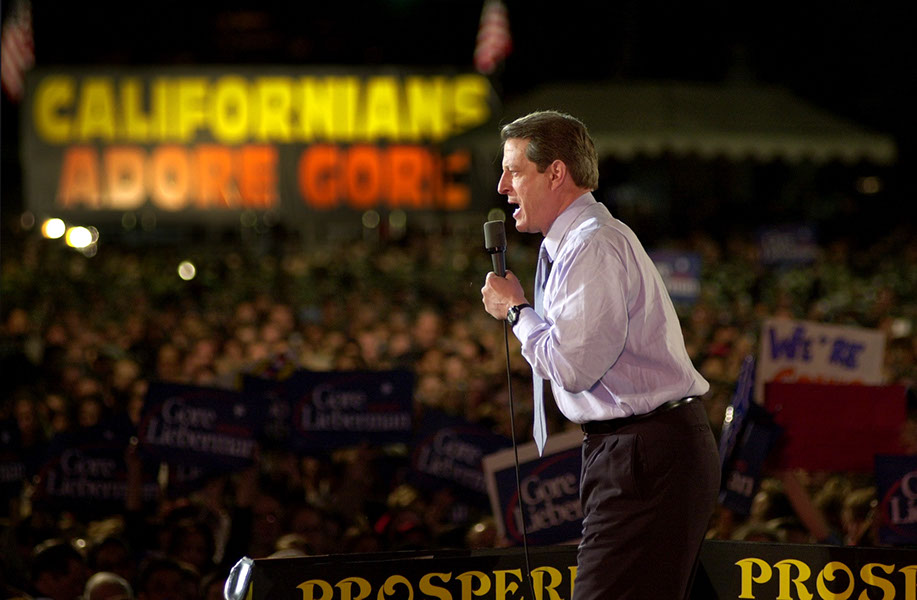

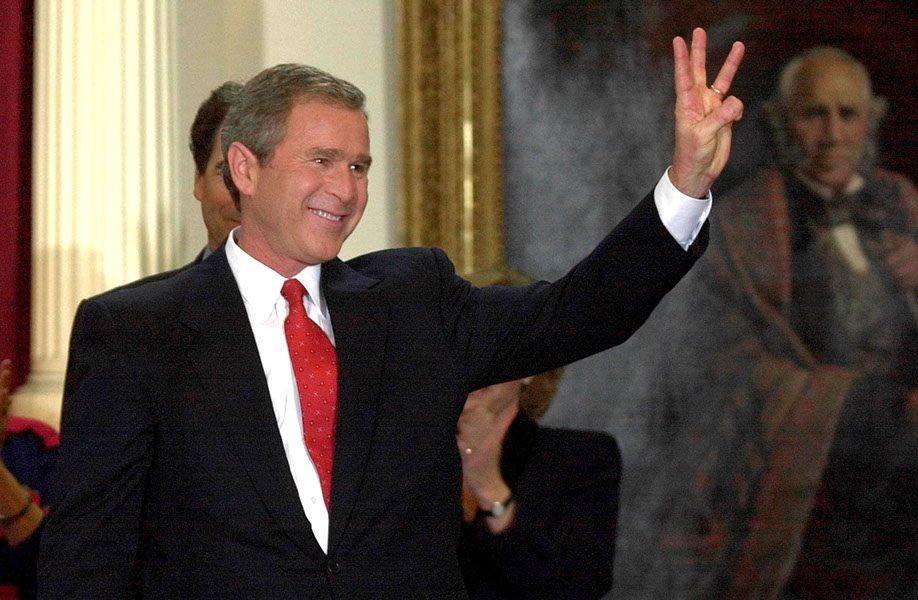
Al Gore and George W Bush during the third and final presidential debate of the campaign. (Pool photo/Newsmakers)
Lorenzo Alvarez, his wife Angelica Alvarez and their three children watch Al Gore and George W Bush during the first presidential debate (Photo by Joe Raedle/Newsmakers)
Republican presidential candidate George W. Bush, left, addresses supporters at a campaign rally in Burbank, CA (Photo by David McNew/Newsmakers)
Democratic presidential candidate Vice President Al Gore addresses the crowd during a campaign rally at Westwood Village in Los Angeles, CA. (Photo by David McNew/Newsmakers)
Newspapers give the results of the U.S. Supreme Court''s decision to halt the Florida ballot recount, claiming George W. Bush as the victor for the presidency. (Photo by Chris Hondros/Newsmakers)
President-Elect George W. Bush celebrates his victory as the 43rd President of the United States. (Photo by Robert Daemmrich Photography Inc/Sygma via Getty Images)
1 - 6
<
>
JULIET SCHOR
“The 2000 election was a moment in which, for a lot of people, trust, belief and faith in the electoral system was eroded pretty dramatically.”
Watch
With neither candidate able to establish a lead, the Presidential election would be decided by whoever won the state of Florida.
A group of protesters protest the election in Austin, Texas, November 9, 2000. (Photo by Joe Raedle/Newsmakers)
JONATHAN WEILER
“The Governor Jeb Bush, whose brother George W. Bush was running for president, had hired a firm to scrub the voter rolls. The goal was to remove felons who, under Florida law, even once you've served your term for a felony, you still do not have your voting rights restored in Florida, and subsequent investigation showed very clearly that several thousand of the people who had been scrubbed, were wrongly scrubbed. These voters who were expunged were overwhelmingly African-American. African-Americans, of course, vote 90 per cent plus for the Democratic Party.”
Watch
A first count of votes gave George W. Bush a marginal victory, automatically triggering a machine recount.
A second manual recount would see the Bush team appeal to the Supreme Court to stop the recount process, eventually handing victory to George W. Bush.
US Presidential election 2000
Source: US National Archives and Records Administration

JULIET SCHOR
“Many people believe he stole the election through the political power - number one, of his brother, who was the governor of Florida. And then, the fact that he had a Supreme Court which handed the election to him.”
Watch
Within a year of George W. Bush taking office, the United States would be rocked by the attacks of September 11th, 2001.
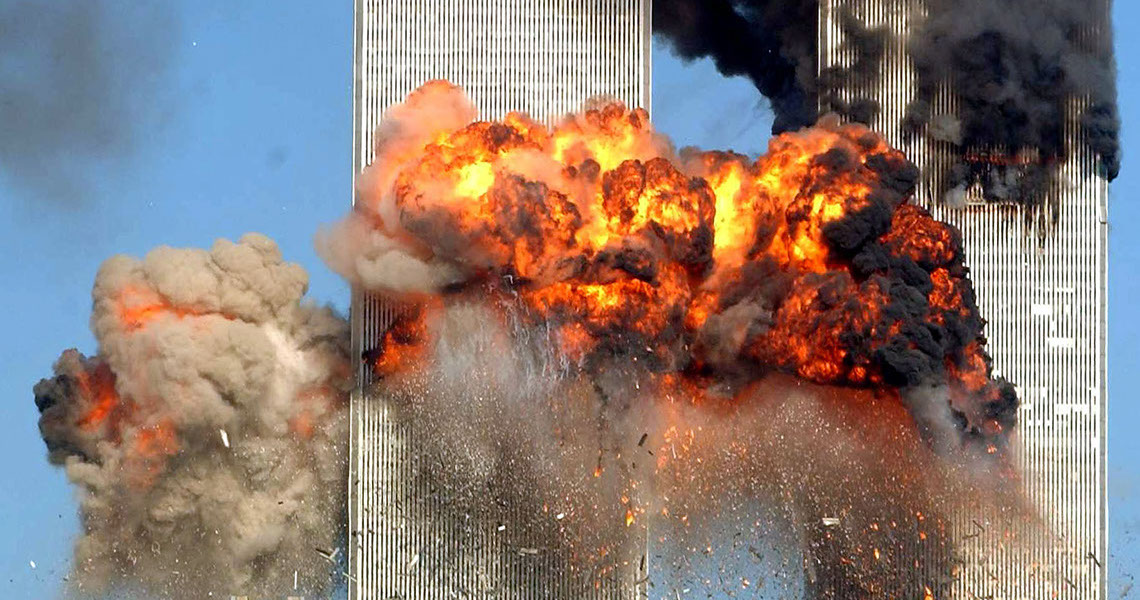
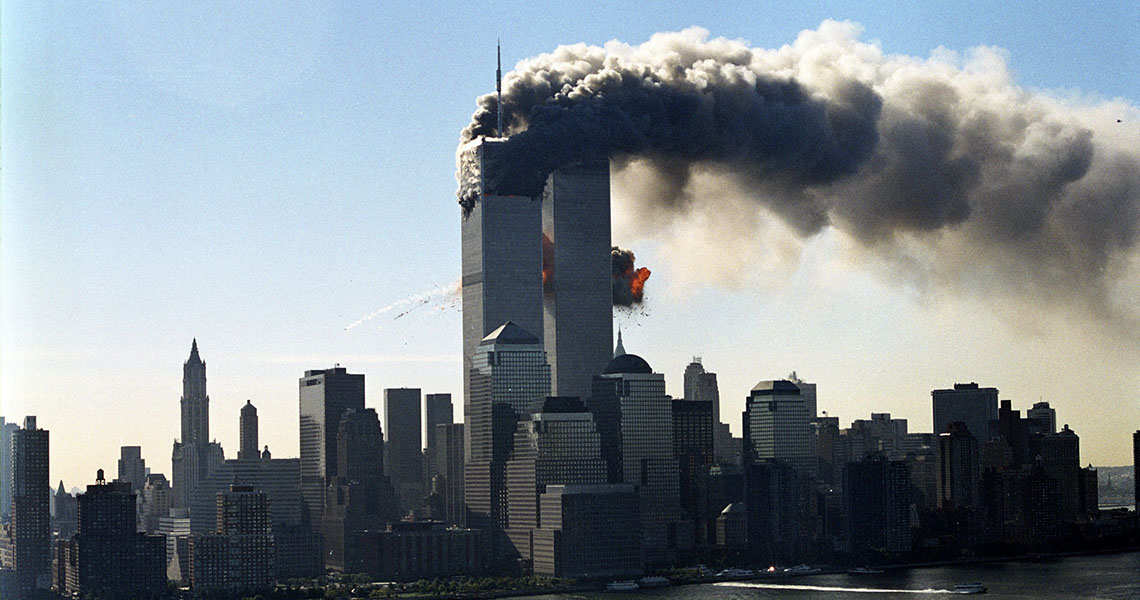
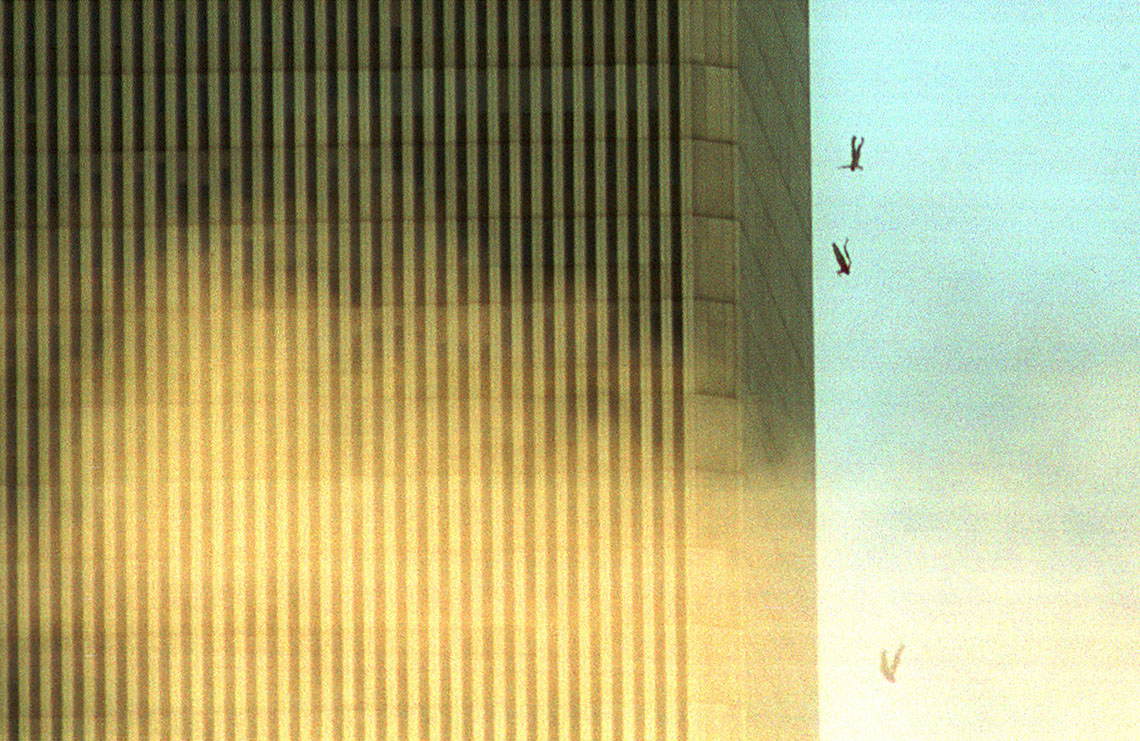
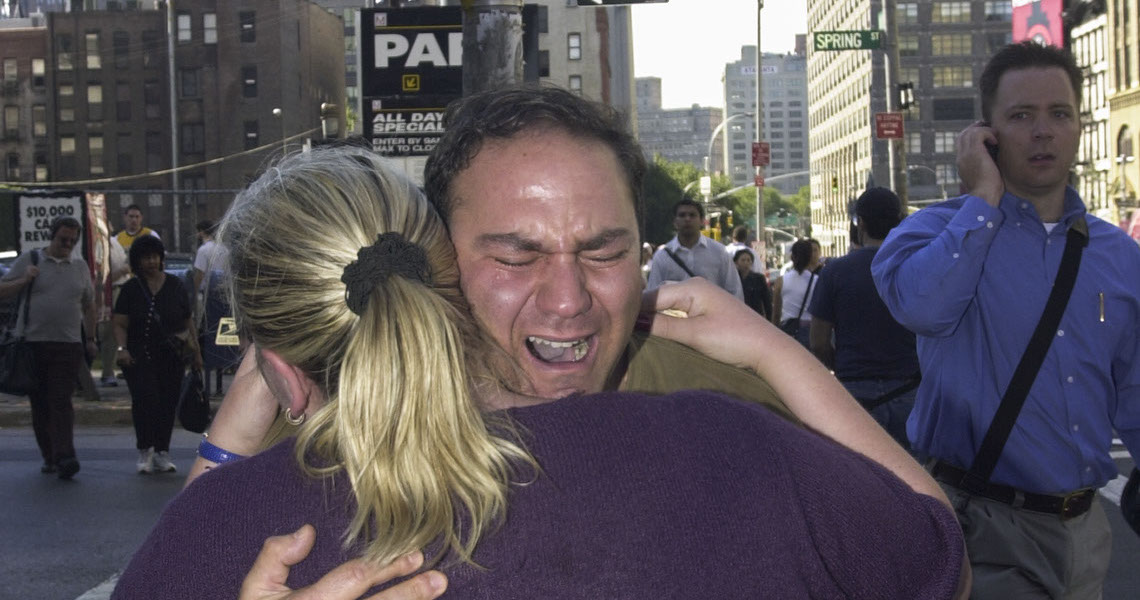
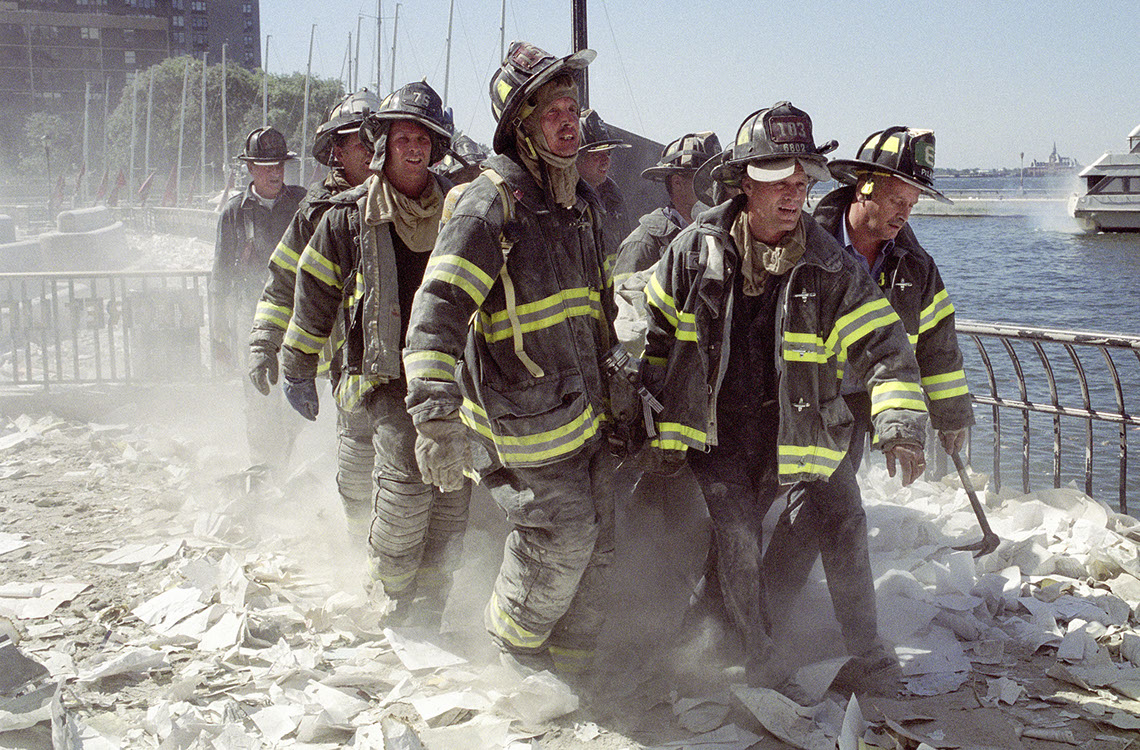
Hijacked United Airlines Flight 175 from Boston crashes into the south tower of the World Trade Center and explodes at 9:03 a.m. on September 11, 2001 in New York City. (Photo by Spencer Platt/Getty Images)
The second hijacked plane is seen as it hits the second tower of the World Trade Center. (Photo by Masatomo Kuriya/Corbis via Getty Images)
People jump to their deaths from the World Trade Center after it was hit by two planes and engulfed in smoke and flames during a suspected attack September 11, 2001 in New York City. (Photo by David Surowiecki/Getty Images)
A man and woman comfort one another during the attack on The World Trade Center on Sept. 11, 2001. (Photo by Matt Moyer/Corbis via Getty Images)
FDNY firefighters carry fellow firefighter, Al Fuentes, who was injured in the collapse of the World Trade Center on Sept. 11, 2001. (Photo by Matt Moyer/Corbis via Getty Images)
4 - 5
<
>
What happened on September 11 2001?
•
•
•
•
•
On the morning of September 11, 2001, four domestic passenger airliners were simultaneously hijacked by 19 al-Qaeda members, with the sole intention of crashing them into major US landmarks.
8:46am - American Airlines Flight 11 crashed into the North Tower of the Word Trade Center complex in New York City.
9:03am - United Airlines Flight 175 crashed into the South Tower of the World Trade Center complex.
9:37am - American Airlines Flight 77 crashed into the western facade of the Pentagon in Arlington County, Virginia, leading to a partial collapse of the building.
10:07am - United Airlines Flight 93 crashed into a field in Stonycreek Township near Shanksville, Pennsylvania, after its passengers attempted to overcome the hijackers and retake control of the plane.
The attacks killed nearly 3,000 people, while injuring more than 6,000 others.
JONATHAN WEILER
“He instantly became extraordinarily popular and was able to make the war on terror and the possibility, or the probability, that if Americans were not ever vigilant, we would suffer more horrific attacks of the sort that we suffered on 9/11.”
Watch
A president who had assumed power under a cloud of uncertainty, now found new poise and new purpose.
“Freedom and fear are at war. The advance of human freedom now depends on us. We will not tire, we will not falter, and we will not fail.”
- George W. Bush
George W. Bush's speech
2
Stellar Wind and the surveillance state
President George Bush delivers speech before signing Patriot Act Anti-Terrorism Bill at the White House. (Photo by Rich Lipski/The Washington Post via Getty Images)
“It's not only not trusting institutions, and not trusting the government, but also not trusting the person next door.”
- Juliet Schor
As the US government
As the US government promised a more vigilant defense against any further attacks on American soil, vigilance would extend to domestic surveillance.
The Bush administration granted new powers for US security services to spy on US citizens.
Thomas Drake was a senior executive with the National Security Agency (NSA) at the time of the September 11 attacks.
THOMAS DRAKE
THOMAS DRAKE
“9/11 was used as an excuse to justify an extraordinary expansion of secret power under the mantle of national security.”
Watch
“What the government did right after 9/11 was licence unto itself the ability to create a National Security law, exempting itself from the constraints of the Constitution and literally all statutes that governed its activities up to that point. In the deepest of secrecy, and with the approval of the White House, the NSA employed a program called Stellar Wind. Stellar Wind was the mass Domestic Surveillance Program.”
Watch
Stellar Wind was the codename for what was officially known as the President’s Surveillance Program. It would involve the mining of data, telephone, email and internet activity, as well as the financial transactions of American people by the American government.
What was Stellar Wind?
•
•
•
Stellar Wind or Stellarwind was the codename of information collected under the President's Surveillance Program (PSP).
Under the programme, the NSA was authorised to monitor Americans' telephone calls and internet metadata without court-approved warrants.
The secret programme's controversial activities required data mining a large database of telephone conversations, email communications and financial transactions.
THOMAS DRAKE
JULIET SCHOR
NAOMI WOLF
“So you're willing to set aside the very form of governance that makes the American experience unique – that gave rise to the American Dream: life, liberty and the pursuit of happiness. We're going to turn our country inside out. We're gonna make everything suspicious, or possibly suspicious, because we have to, for the sake of national security."
“You have big appeals to fear. And there's a whole other dimension to this – it's not only not trusting institutions, and not trusting the government, but also not trusting the person next door.”
Watch
“In addition to that, you had the Patriot Act. You had more and more laws that give the executive more and more power. You invoke a terrifying internal and external threat like “the global war on terror”. It's a thing, terrorism is a thing, but it's a crime. It's a set of crimes. There are laws to deal with it. You don't need to close down a civil society to deal with them.”
Watch
Watch
New legislation and new bodies such as the Patriot Act and the Department of Homeland Security, while set up to protect America, were, according to critics, compromising the civil liberties of the American people.
What is the USA PATRIOT Act?
•
•
•
•
On October 26, 2001, the USA PATRIOT Act was signed into law by President George W. Bush.
USA PATRIOT is an acronym for Uniting and Strengthening America by Providing Appropriate Tools Required to Intercept and Obstruct Terrorism Act.
Since its inception, several legal challenges have been brought against the controversial act. Federal courts have also challenged the constitutionality of a number of provisions.
On May 26, 2011, President Barack Obama signed the PATRIOT Sunsets Extension Act of 2011, a four-year extension that renewed three key elements of the legislation: roving wiretaps, searches of business records, and conducting surveillance of so-called "lone wolves".
What is the US Department of Homeland Security?
•
•
The United States Department of Homeland Security (DHS) is a cabinet department of the United States federal government with responsibilities in public security.
Signed into law by President George W. Bush in 2002, the department was established in direct response to the September 11 attacks, to improve domestic security coordination and communication.
“The continuing threat of terrorism, the threat of mass murder on our own soil, will be met with a unified, effective response.”
- George W. Bush
George W. Bush's speech
“Even one percent insecurity is too much.”
- Xenia Wickett
In late 2001, Xenia Wickett was tasked with launching the Bush administration’s Office of Homeland Security Affairs.
XENIA WICKETT
“The idea that anything was too much, that we needed to protect ourselves 100 percent, and of course, this was impossible. But that sentiment really defined, in many respects, how Homeland Security was thought of at the beginning.”
Watch
3
The ‘war on terror’, racial politics & a loss of faith
in the establishment
S. Marine 1st Sergeant Rodolfo Sarino (L) and Lance Corp Jason Canellis, from Vandera, Texas, of the U.S. Marine scouts of the 1st Light Armored Reconnaissance (LAR) company, keep watch near a mosque while clearing it November 20, 2004 in Fallujah, Iraq. (Photo by Scott Peterson/Getty Images)
“The demonisation of Muslims after 9/11 is certainly one of the most important political stories of this era.”
- Jonathan Weiler
President Bush
President Bush would seek retribution for the attacks on the US homeland by executing a so-called ‘war on terror’.
The invasions of Afghanistan and Iraq would alienate sections of the Muslim world.
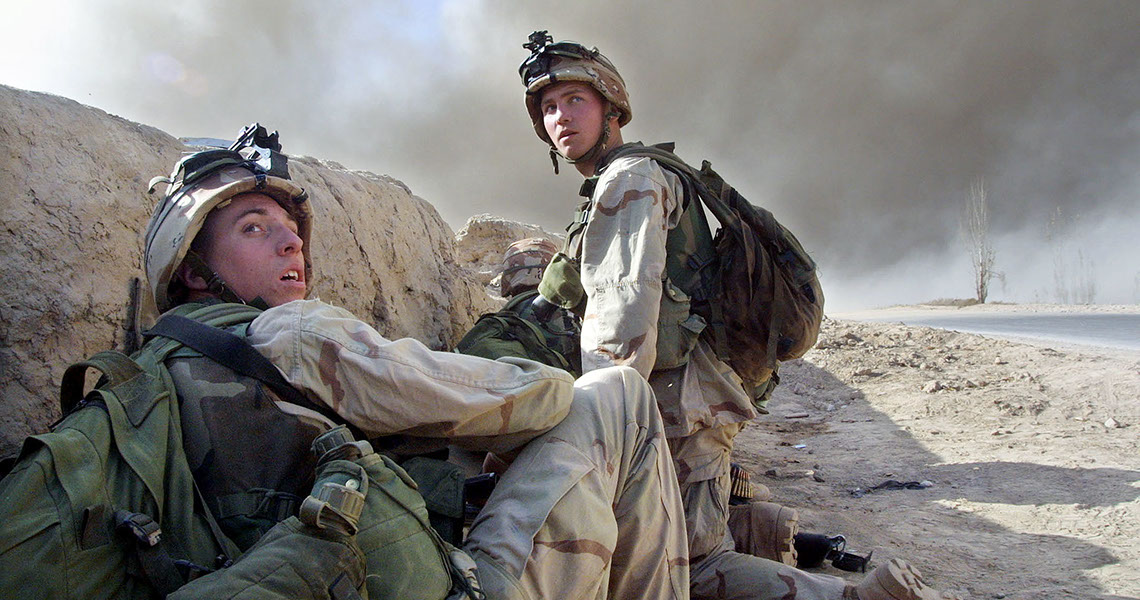
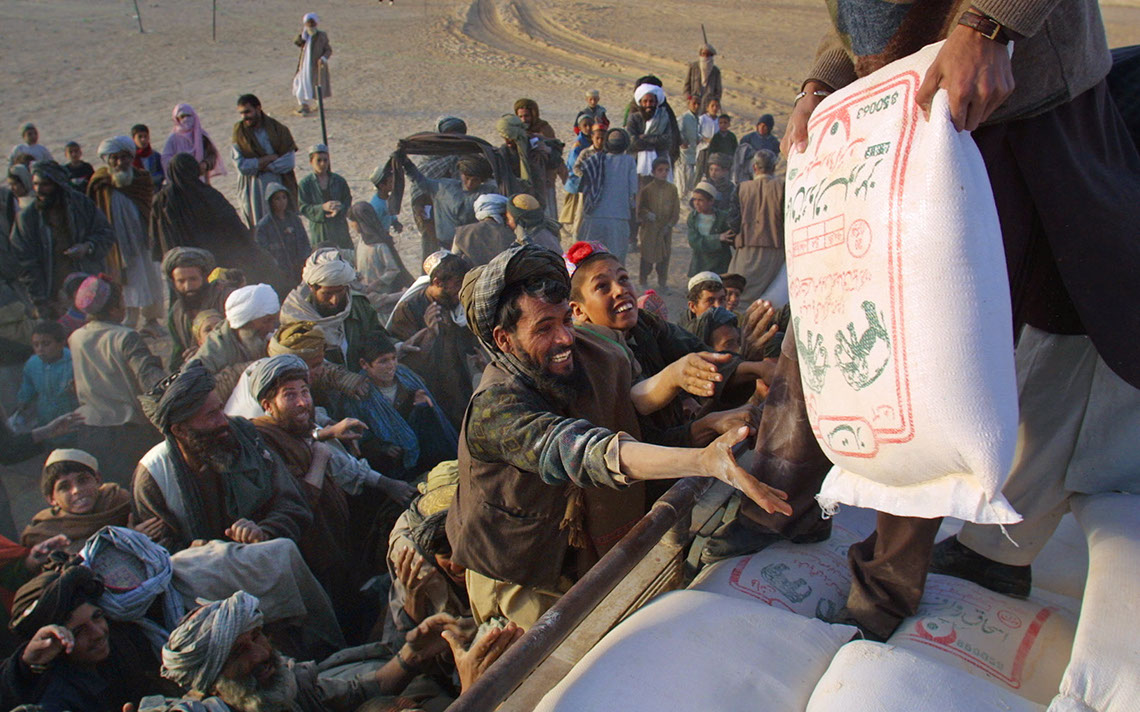
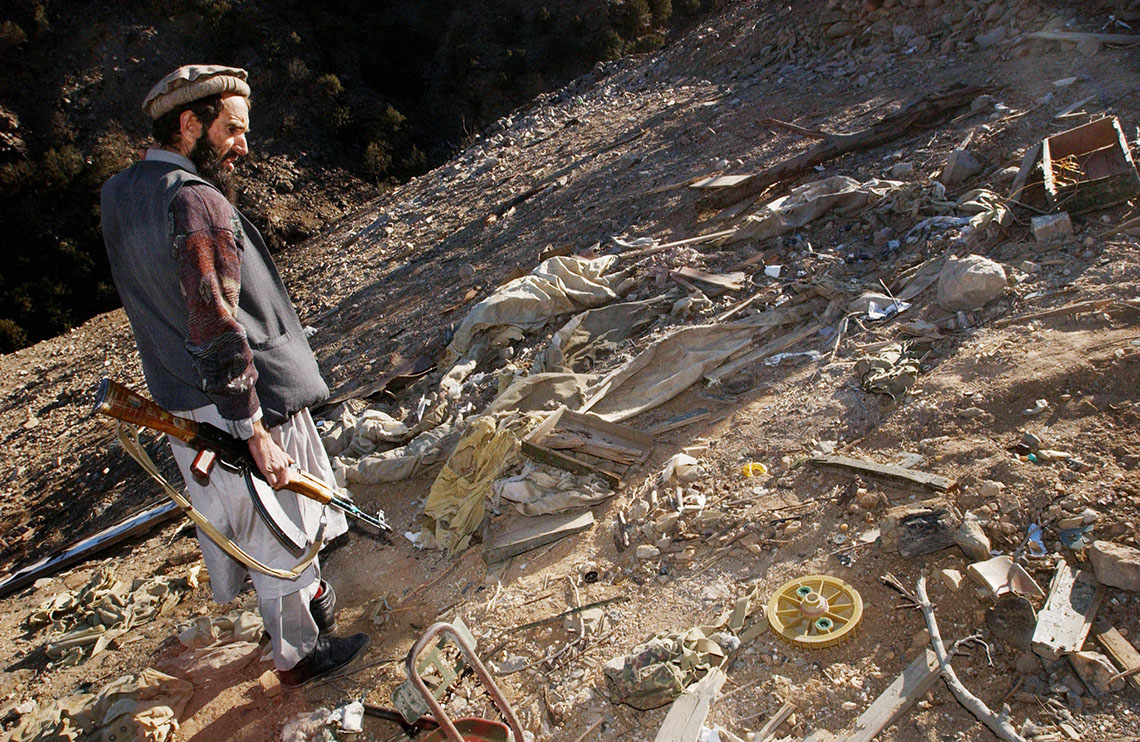
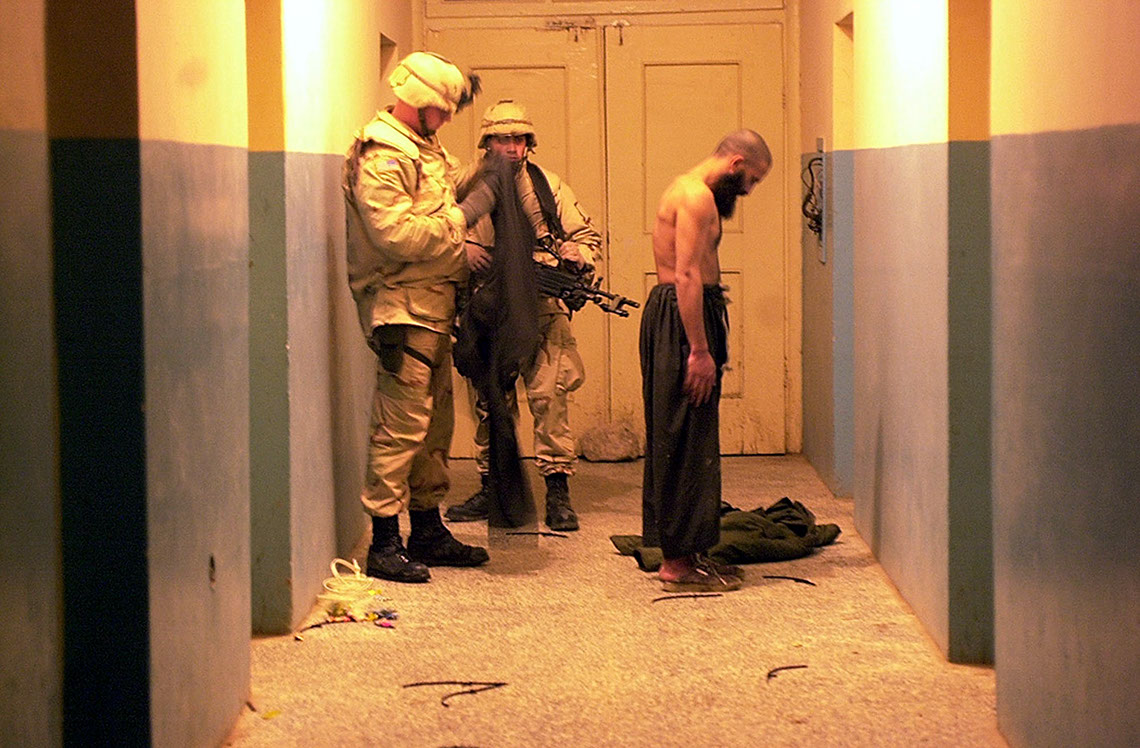
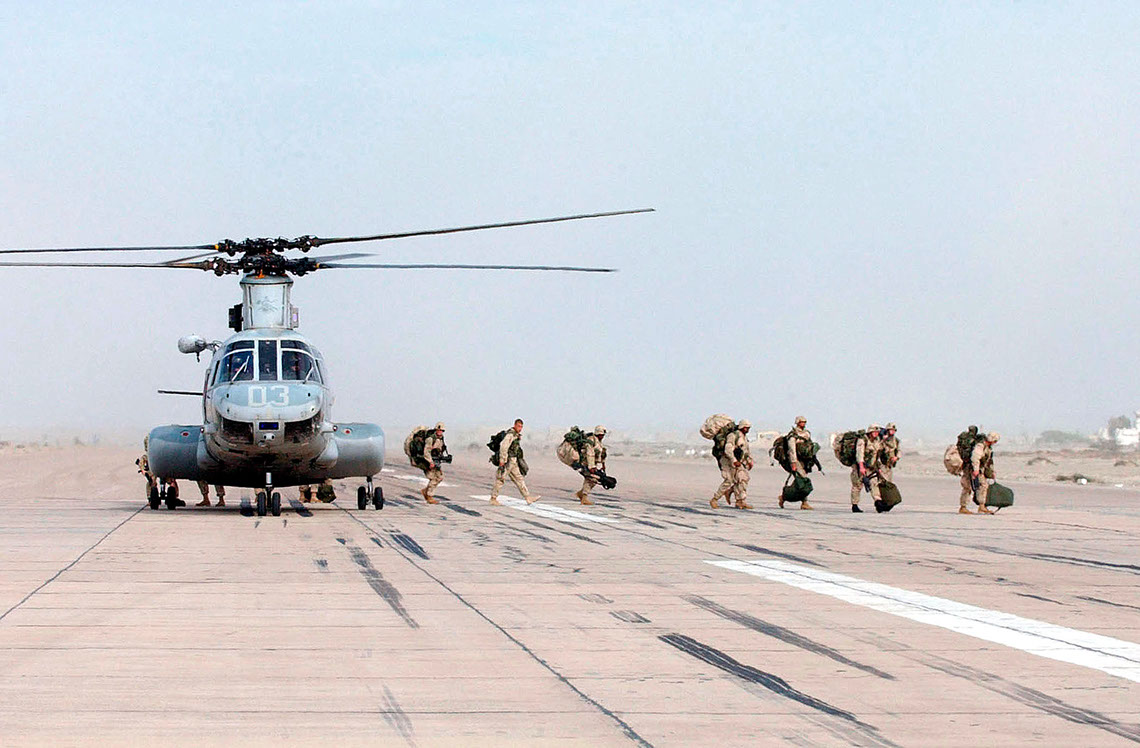
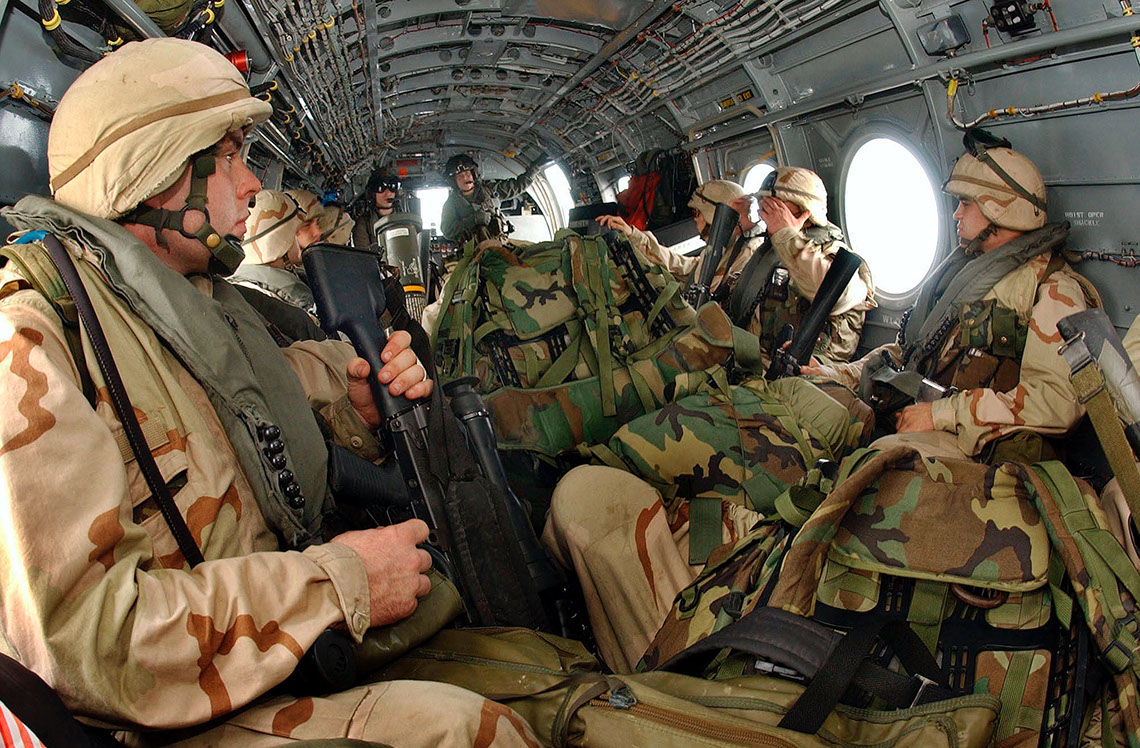
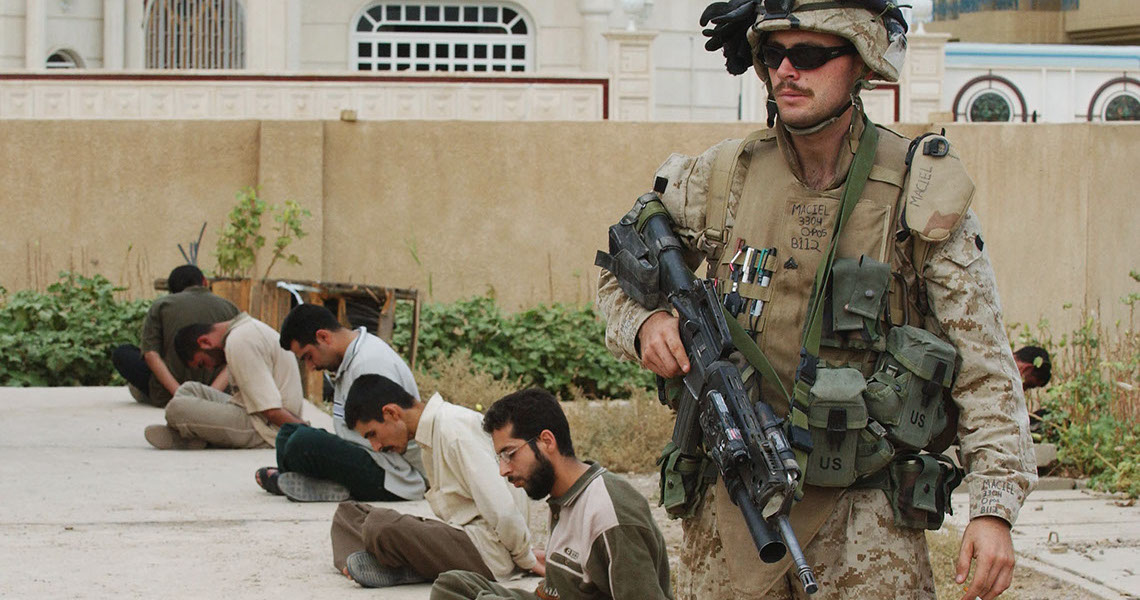
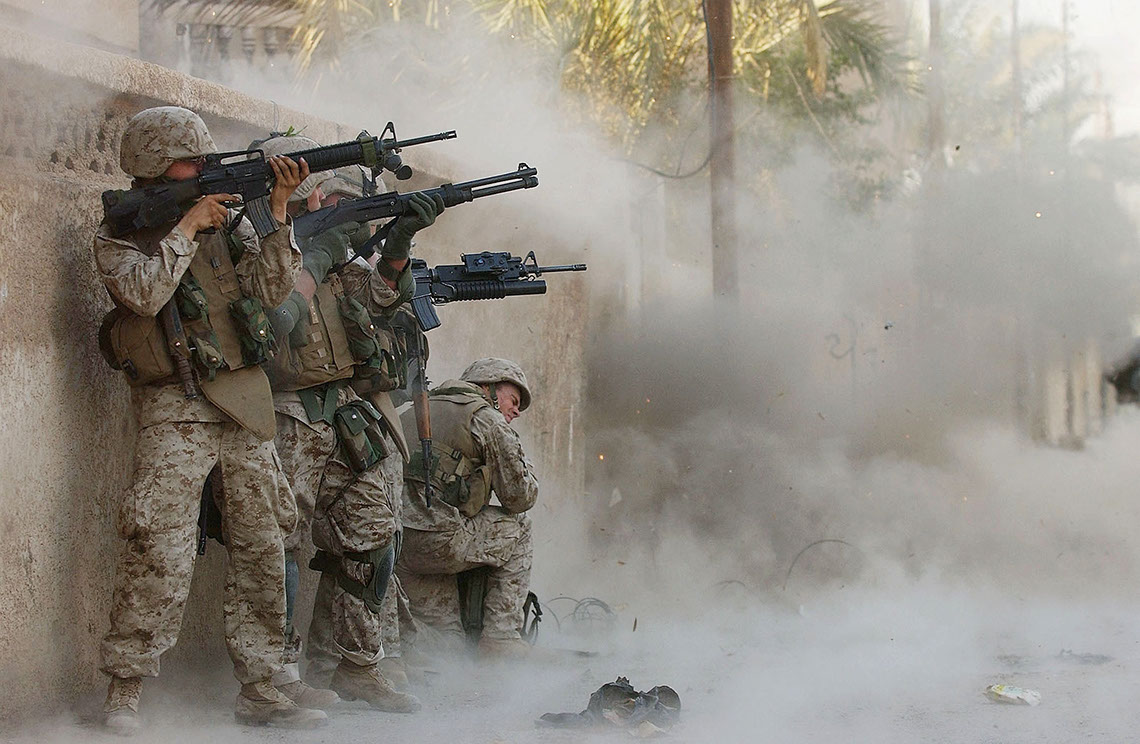
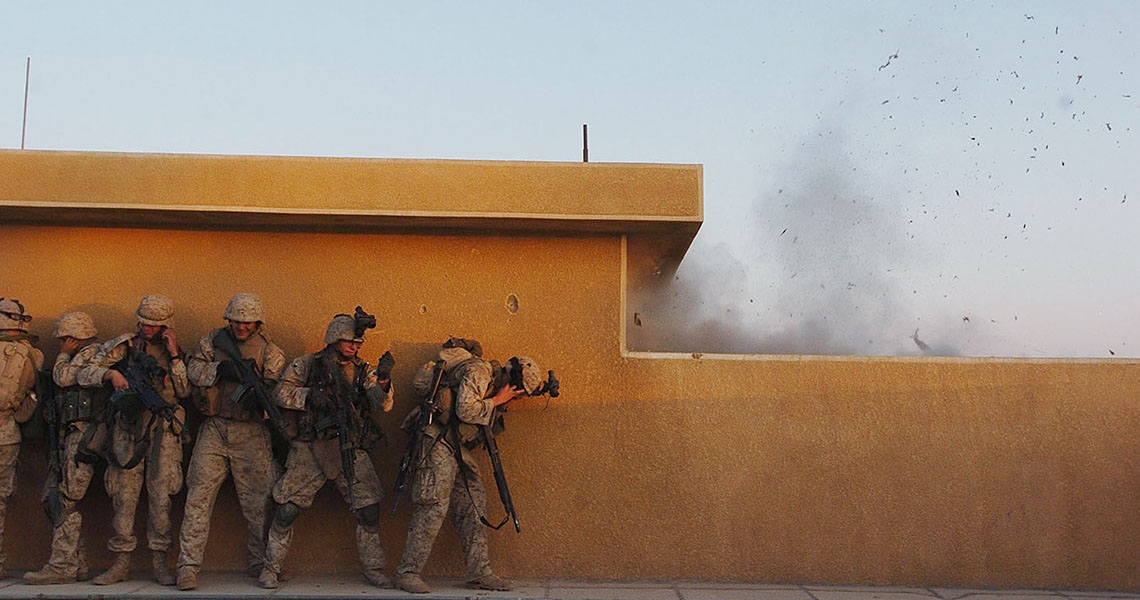
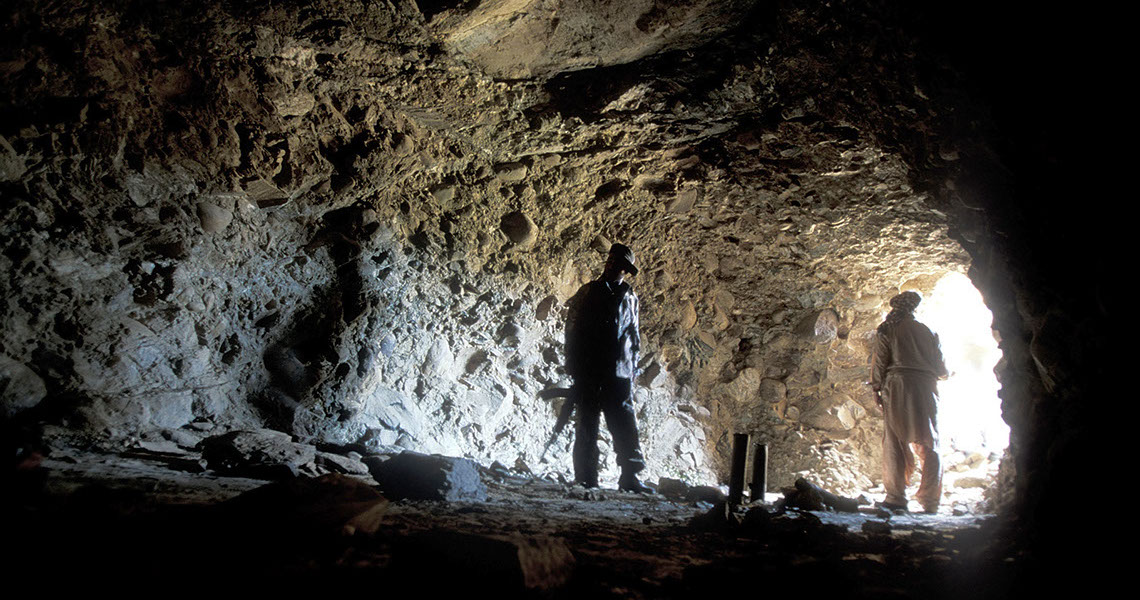
American soldiers hide behind a barricade during an explosion prior to fighting with Taliban forces November 26, 2001 at a prison fortress near Mazar-i-Sharif, Afghanistan. (Photo by Oleg Nikishin/Getty Images)
Afghan refugees at the Kili Faizo refugee camp desperately reach for bags of rice and sugar being handed out by a local aid organization December 4, 2001 near Chaman, Pakistan on the Afghanistan border. (Photo by Paula Bronstein/Getty Images)
A mujahadeen fighter looks at the remains of a former al Qaeda training camp December 18, 2001 in the Tora Bora area of Afghanistan. (Photo by Chris Hondros/Getty Images)
An English speaking Taliban prisoner is processed and carefully strip searched and secured for transport December 30, 2001 from Mazar-e Sharif to Camp Rhino, Kandahar, Afghanistan. (Photos by SSgt. Cecilio Ricardo Jr./Getty Images)
US Marines with the 26th Marine Expeditionary Unit deployed from the USS Bataan's Amphibious Ready Group arrive December 14, 2001 at an undisclosed location with field gear and weapons. (Photo by Johnny Bivera/Getty Images)
US Marines with the 26th Marine Expeditionary Unit deployed from the USS Bataan's Amphibious Ready Group fly in a CH-46E Sea Knight helicopter December 14, 2001 to an undisclosed location with field gear and weapons. (Photo by Johnny Bivera/Getty Images)
U.S Marines from the 1st U.S Marines Expeditionary Force, 1st Battalion, 3rd Marines Regiment, Bravo Company, guard detainees during operations on November 17, 2004 in Fallujah, Iraq. (Photo by Marco Di Lauro/Getty Images)
US Marines of the 1st Light Armored Reconnaissance (LAR) company, as part of 1st Battalion 3rd Marines, use explosives to open a metal gate to a house, as they search houses for insurgents on November 22, 2004 in Fallujah, Iraq. (Photo by Scott Peterson/Getty Images)
US Marines of the 1st Light Armored Reconnaissance (LAR) company, as part of 1st Battalion 3rd Marines, use explosive to open rooftop doors, as they search houses for insurgents on November 22, 2004 in Fallujah, Iraq. (Photo by Scott Peterson/Getty Images)
This cave in the Tora Bora Mountain is Bin Laden's last known house on July, 2004 in Afghanistan. (Photo by Reza/Getty Images)
1 - 10
<
>
Despite attempts to claim otherwise, many Muslims, including American Muslims, would see the so-called ‘war on terror’ as a war on them.
America’s racial politics took on a new form, as the devastation wrought by Hurricane Katrina across southern states in August 2005 exposed stubborn divisions of old.
And point to a president out of touch with the people.
JONATHAN WEILER
“The demonisation of Muslims after 9/11 is certainly one of the most important political stories of this era. They were already a kind of ‘demon figure’ in American political culture – the entire foreign policy that George W Bush ended up prosecuting, I think, only reinforced the demonisation of Islam and of Muslims, including in the United States.”
Watch
U.S. President George W. Bush (L) sits with Patrick Wright on the steps of what was his parents' house September 2, 2005 in Biloxi, Mississippi. (Photo by Win McNamee/Getty Images)
JONATHAN WEILER
JULIET SCHOR
JONATHAN WEILER
“He was already unpopular, and then Katrina hit, and the response to it … well, first of all, the visual images of the utter destruction of New Orleans, the loss of life and what seemed to be the utterly incompetent response by the federal government.”
Watch
“It exposed stunning indifference to the fate of people there because they were poor; because they were black.”
Watch
“Katrina fed a larger narrative: That this is a government, this was an administration that didn't really care about ordinary people, that didn't have the time to focus on immediate needs domestically because it was so busy prosecuting what, by then, were unpopular wars overseas.”
Watch
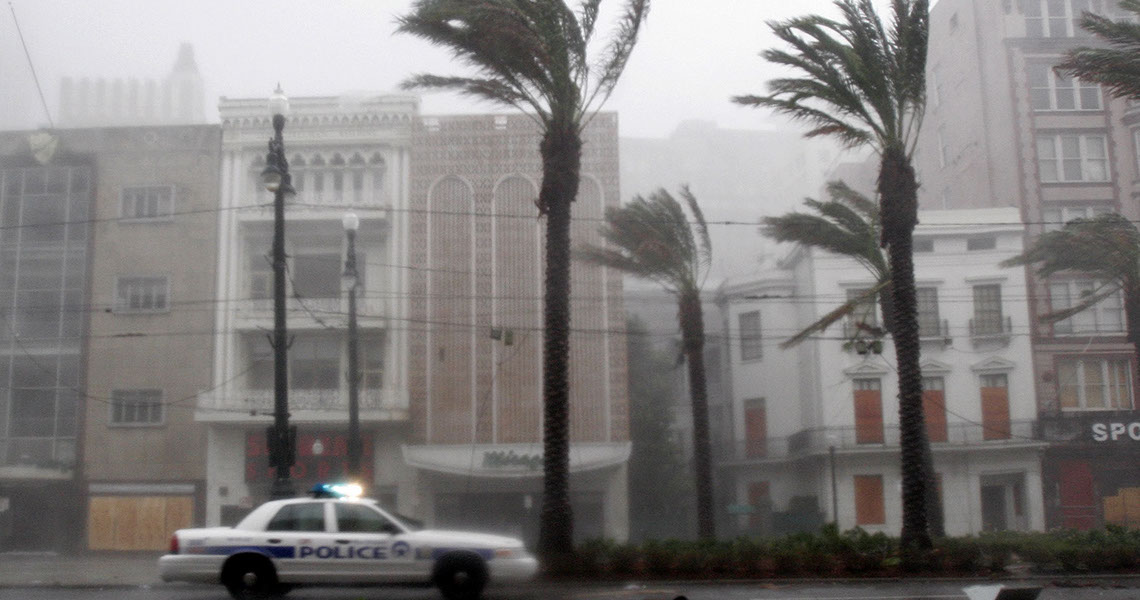
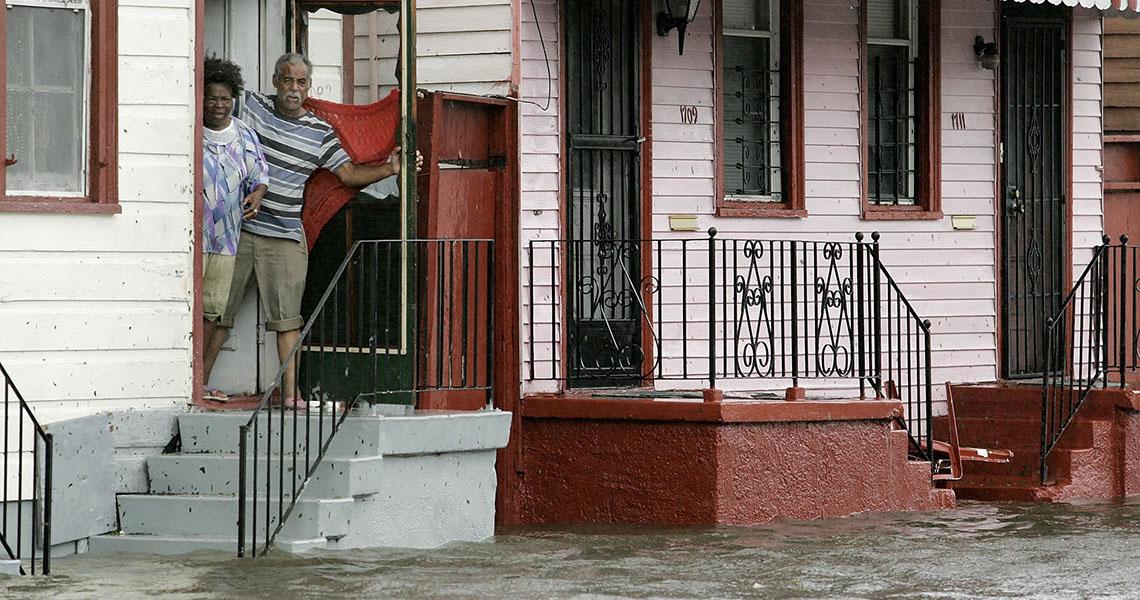
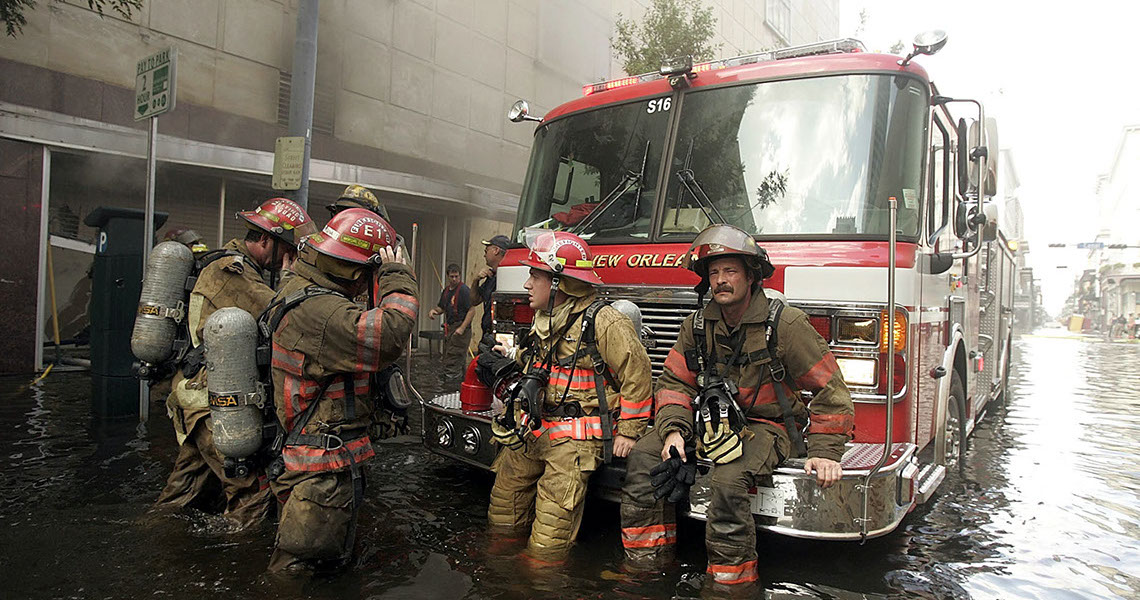
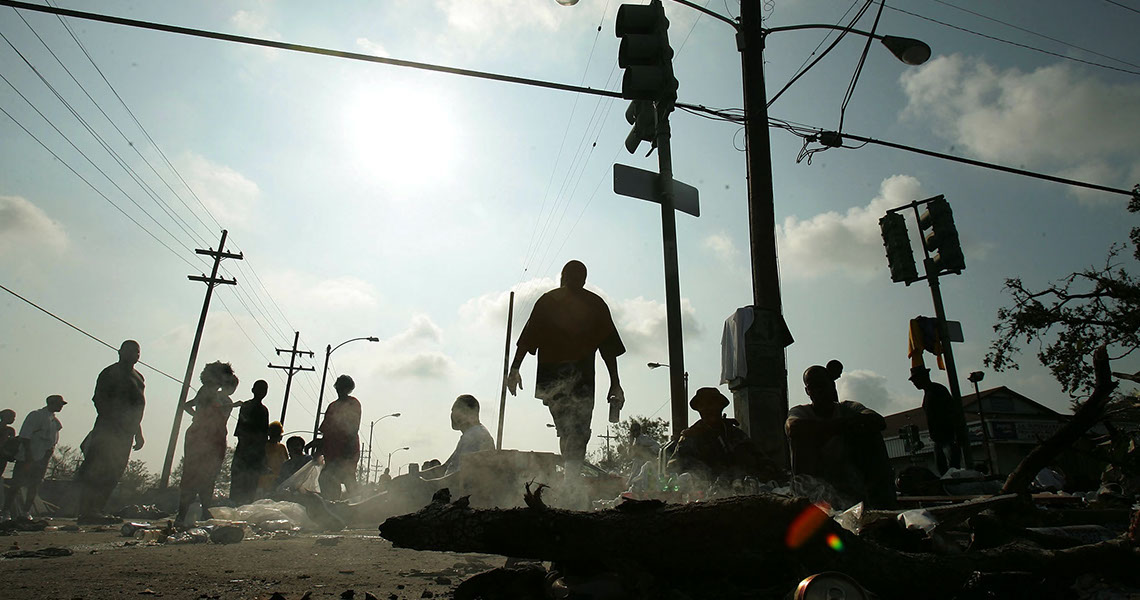
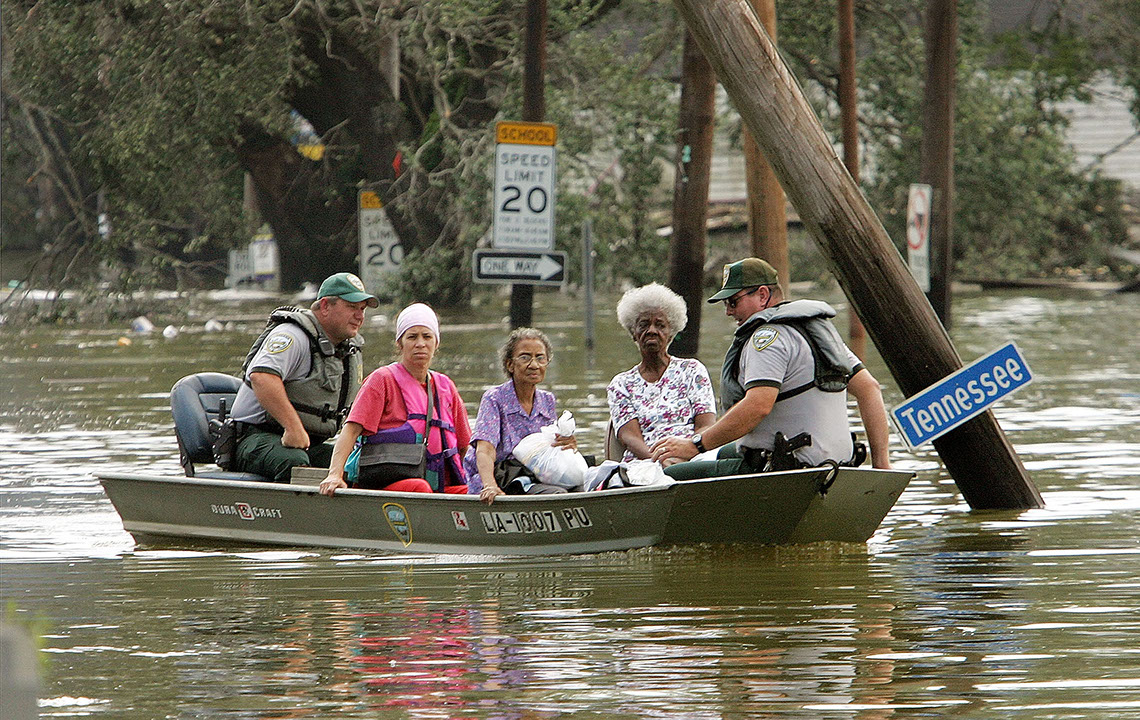
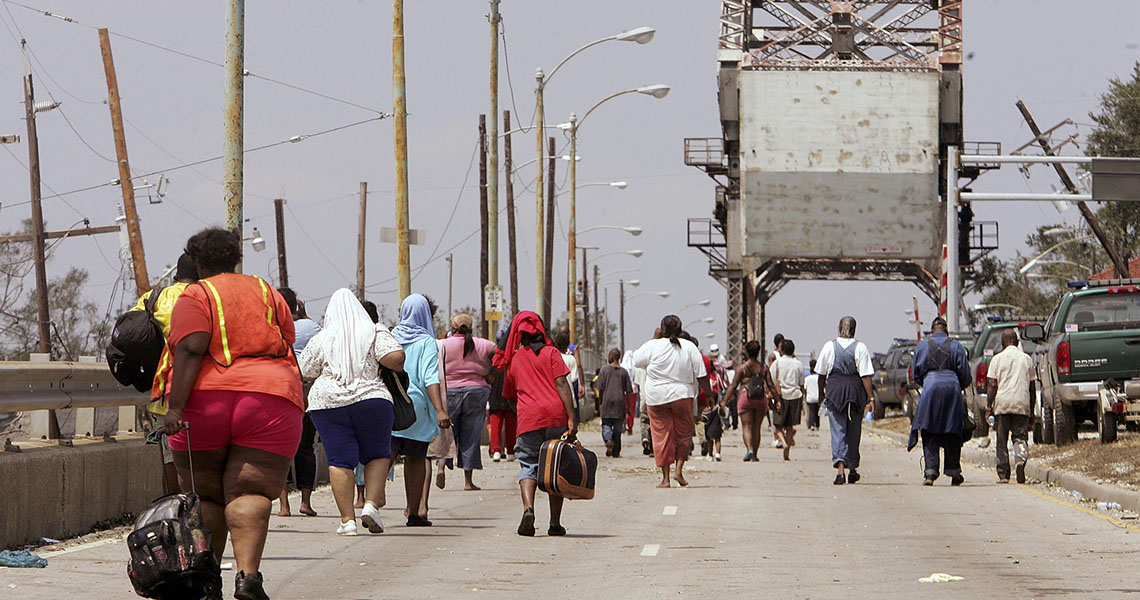
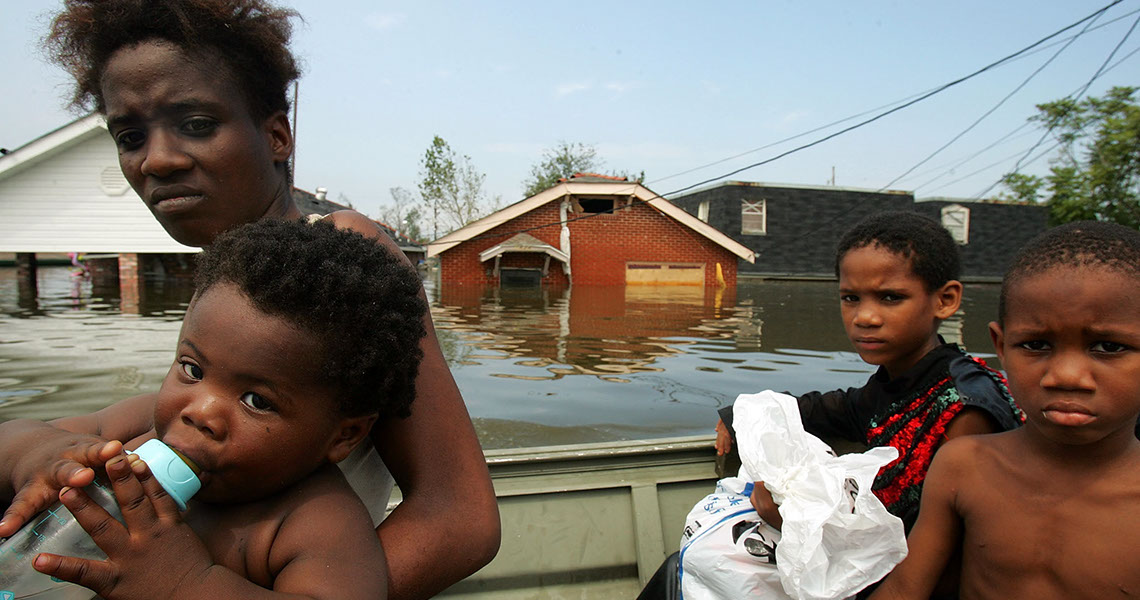
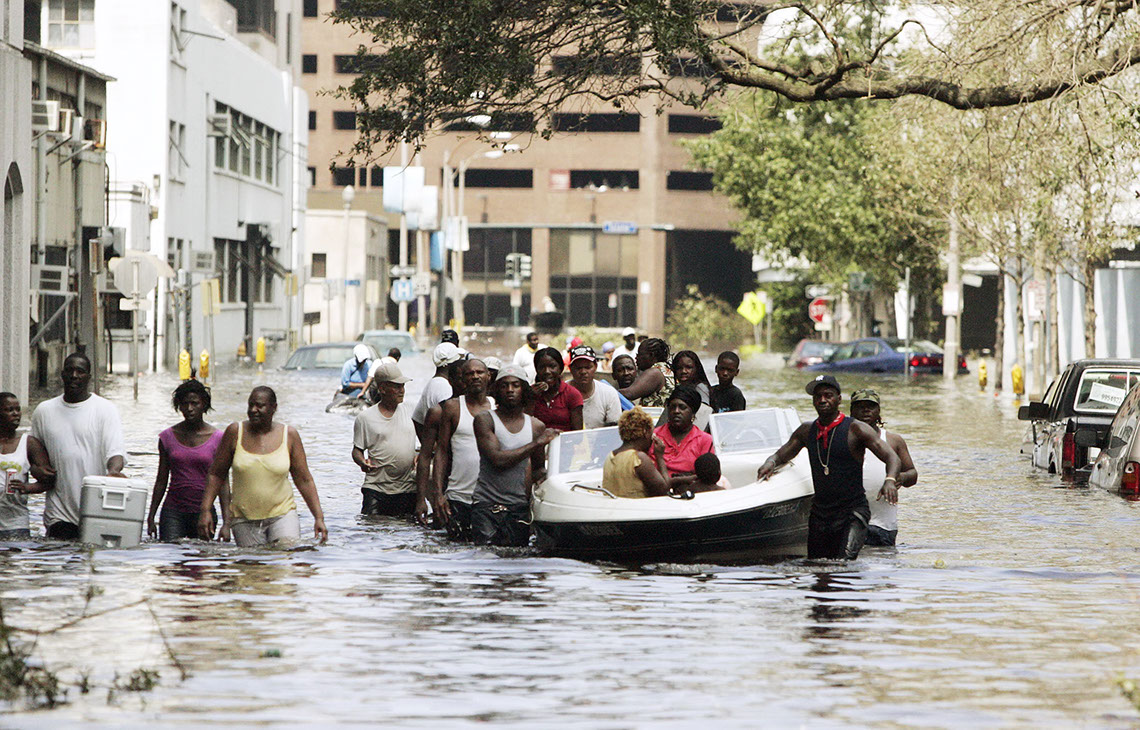
A New Orleans Police car drives down Canal Street during Hurricane Katrina early in the morning August 29, 2005 in New Orleans, Louisiana. (Photo by Chris Graythen/Getty Images)
People come out of their homes to a flooded street after Hurricane Katrina hit the area with heavy wind and rain August 29, 2005 in New Orleans, Louisiana. (Photo by Mark Wilson/Getty Images)
Firefighters take a break after coming out of a store that is on fire on Canal Street August 31, 2005 in New Orleans, Louisiana. (Photo by Mark Wilson/Getty Images)
People wait for assistance after being rescued from their homes a day earlier in the Ninth Ward as a small fire burns after Hurricane Katrina August 31, 2005 in New Orleans, Louisiana. (Photo by Mario Tama/Getty Images)
People are taken ashore in a boat after being rescued from their homes in high water in the Ninth Ward after Hurricane Katrina struck August 30, 2005 in New Orleans, Louisiana. (Photo by Mario Tama/Getty Images)
Survivors from the Lower Ninth Ward walk to a bridge crossing the Industrial Canal after being rescued by boat from their homes during the aftermath of Hurricane Katrina August 30, 2005 in New Orleans, Louisiana. (Photo by Mario Tama/Getty Images)
A mother and her children are rescued by boat from the Lower Ninth Ward during the aftermath of Hurricane Katrina August 30, 2005 in New Orleans, Louisiana. (Photo by Mario Tama/Getty Images)
People make their way through the flooded streets of New Orleans following the devastation of Hurricane Katrina. (Photo by Michael Appleton/NY Daily News Archive via Getty Images)
1 - 8
<
>
Hurricane Katrina, August 2005
•
•
•
•
•
Hurricane Katrina hit the Gulf Coast on August 29, 2005.
It remains one of the deadliest hurricanes to have ever hit the US with an estimated more than 1,800 people killed during the hurricane and its aftermath.
Katrina also caused one of the largest displacements of people in US history, with an estimated 1.5 million people in Louisiana, Mississippi and Alabama leaving their homes.
Massive flooding left approximately 80 percent of New Orleans under water.
The Bush administration was heavily criticised for its slow response to meeting the emergency needs of the people affected by the disaster.
In 2000, George W. Bush had come to power having lost the popular vote.
Eight years later, an unpopular president who had been marked by unpopular policies, would leave office just as a calamitous financial meltdown sent shockwaves throughout the United States.
America needed hope and called for change.
Those calls would be answered by an unlikely new leader.
Return to top
The new millennium and the war on terror
2000s
The financial crisis, whistle-blowers
& an emerging surveillance state
Next: 2010s

